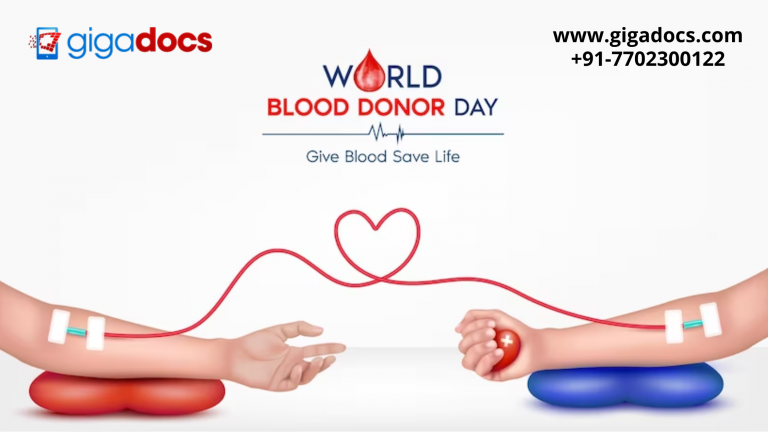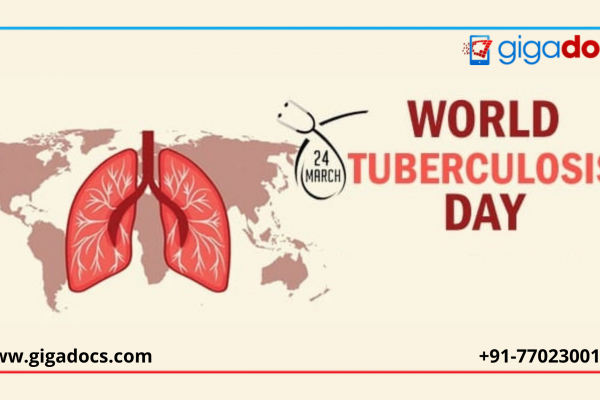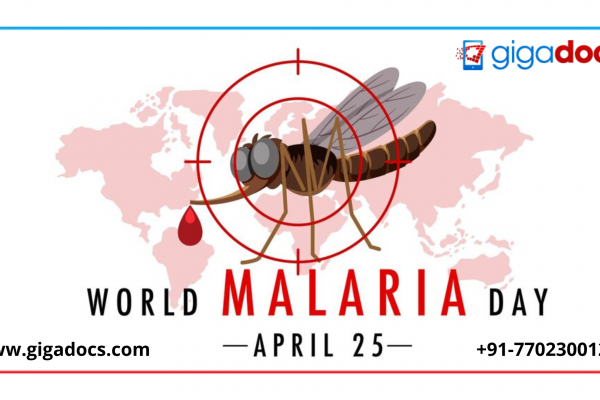Blood – a specialized body fluid comprises four components, plasma, red blood cells, white blood cells, and platelets. Blood transports oxygen and nutrients to the lungs and tissues and forms blood clots to prevent blood loss, which explains why it is indispensable for medical procedures, surgeries, and emergencies.
Blood transfusions are essential for individuals with medical conditions such as cancer, severe anemia, bleeding disorders, and trauma. Blood donation is a noble and selfless act, directly contributing to saving lives and improving the health and well-being of needy patients. Blood donors contribute to the sustainability of healthcare services, ensuring that hospitals and medical facilities have sufficient blood reserves to meet patient needs.
14 June is observed as World Blood Donation Day. Gigadocs acknowledges and appreciates the generosity and altruism of blood donors. Their contributions are significant in supporting healthcare systems, improving patient outcomes, and sharing hope with individuals and families facing medical challenges.
How can you donate Blood, Plasma, and Platelets?
- Blood donation – involves checking yourself against the blood donation requirements, which include checking on age, weight, general health, and medical history, and eating a nutritious meal to replenish your energy after the blood donation. We have discussed the blood donation requirements in this blog’s FAQ section.
- Plasma donation- voluntarily provides plasma, a blood component, for medical purposes. Plasma is a yellowish fluid comprising about 55% of the total blood volume and contains various proteins, antibodies, clotting factors, and nutrients. Plasma donations are important for producing life-saving therapies and medications, such as immunoglobulins, clotting factors, and albumin, used to treat various medical conditions. Plasma donations create plasma-derived therapies that help treat patients with immune deficiencies, bleeding disorders, burns, neurological conditions, and other medical conditions. These therapies provide vital components or antibodies found in plasma to help improve patients’ health.
- Platelet donation- also known as plateletpheresis, is a specialized form of blood donation that focuses on collecting platelets, a blood component that plays a crucial role in clotting. Platelets are primarily used to help patients with bleeding disorders, such as those undergoing chemotherapy, organ transplants, or surgeries. Platelet donation is a necessary process that helps ensure a steady supply of platelets for those in need. Platelet donations provide platelet transfusions to patients with low platelet counts or impaired platelet function. These patients may be dealing with conditions like cancer, severe infections, or blood disorders that affect their ability to produce sufficient platelets.
Which conditions temporarily prevent You from Donating Blood?
Some medical conditions may prevent individuals from donating blood. These temporary conditions are in place to ensure the safety of the donor and the recipient. The specific eligibility criteria can vary slightly depending on the country or blood donation organization, but here are some common examples of conditions that may disqualify someone from blood donation:
- Recent Surgery or Medical Procedures: If you have undergone surgery, major dental work, or received blood products within a specified period, you may be temporarily ineligible to donate blood.
- Pregnancy and Breastfeeding: Pregnant or breastfeeding women are usually deferred from donating blood due to the potential impact on their health and the baby’s health.
- Medications: Certain medications can disqualify individuals from donating blood. Examples include anticoagulants (blood thinners), some antibiotics, and specific immunosuppressive drugs.
It’s important to note that eligibility criteria can vary; new guidelines and advancements may change restrictions over time. Suppose you need clarification about your eligibility to donate blood. In that case, it’s best to consult with your local blood donation center, as they can provide you with the most accurate and up-to-date information based on your specific circumstances.
When determining eligibility, blood donation organizations assess factors such as the type and severity of the autoimmune disease, current symptoms, treatment medications, and overall health status. Some autoimmune diseases, especially those associated with chronic inflammation or immunosuppression, may lead to a temporary or permanent deferral from blood donation.
Individuals with well-controlled autoimmune diseases, who are not on immunosuppressive medications, and do not have active symptoms or complications, may be eligible to donate blood. Each case is evaluated individually, and the final determination rests with the blood donation organization.
Can you Donate Blood if you have a Tattoo?
Yes, you can donate blood, even if you have a tattoo. The eligibility to donate blood after getting a tattoo primarily depends on the safety protocols the tattoo parlor follows.
Contacting your local blood donation center can provide the most accurate and up-to-date information on your region’s tattoo-related blood donation eligibility criteria. They can guide you on any deferral periods, if applicable, based on their safety protocols and screening procedures.
Conditions when a Person Cannot Donate Blood Permanently
Some certain conditions or circumstances can result in permanent deferral from blood donation. These conditions are in place to ensure the safety of the donor and the recipient of the blood. While specific eligibility criteria may vary slightly depending on the country or blood donation organization, here are some common examples of conditions that may permanently disqualify someone from donating blood:
- HIV/AIDS: Individuals infected with HIV or have AIDS are permanently deferred from blood donation due to the risk of transmitting the virus.
- Hepatitis B or C: Chronic carriers of hepatitis B or C are typically permanently deferred from blood donation due to the potential transmission of these viruses.
- Creutzfeldt-Jakob Disease (CJD): Individuals with a history of CJD or certain variants of CJD are permanently excluded from blood donation due to the risk of transmitting the disease.
- Certain Cancers: Individuals with specific types of cancers, such as leukemia or lymphoma, may be permanently ineligible to donate blood.
- Transfusion: Transmitted Infections: Individuals who have received blood transfusions in countries or regions with a high risk of transfusion-transmitted infections, such as variant Creutzfeldt-Jakob disease (vCJD) or malaria, may be permanently deferred.
- Infectious Diseases: Individuals with certain infectious diseases that can be transmitted through blood, such as HIV/AIDS, syphilis, and malaria, are not eligible to donate blood.
- Blood Disorders: Certain blood disorders, such as hemophilia, sickle cell disease, and thalassemia, may prevent someone from donating blood.
- Chronic Illnesses: Chronic conditions such as uncontrolled diabetes, heart disease, high blood pressure, and autoimmune disorders may disqualify individuals from blood donation.
- Intravenous Drug Use: Individuals with a history of intravenous drug use are typically permanently excluded from blood donation due to the increased risk of blood-borne infections.
- Certain Genetic Conditions: Some genetic conditions, such as hemochromatosis or sickle cell disease (under specific circumstances), may result in permanent deferral.
It’s important to remember that eligibility criteria vary; new guidelines and advancements may change restrictions over time. Consult your local blood donation center for the most accurate and up-to-date information based on your location.
Blood Donation Myths Busted
Here are some common blood donation myths debunked:
- Myth 1: Donating blood is painful and unsafe.
- Fact: Donating blood is a relatively simple and safe process. The needle insertion may cause a brief discomfort but is generally not considered painful. The equipment used is sterile and disposable, ensuring the safety of both the donor and the recipient.
- Myth 2: Donating blood will make you weak and tired.
- Fact: While it is normal to feel slightly fatigued after donating blood, this feeling is temporary. After a short rest and replenishing fluids and snacks, most donors resume regular activities without significant weakness or tiredness.
- Myth 3: People with tattoos or piercings cannot donate blood.
- Fact: A tattoo or piercing does not automatically disqualify someone from donating blood. In many cases, individuals with tattoos or piercings can donate blood as long as the tattoo or piercing is done at a licensed and regulated establishment that follows appropriate safety practices.
- Myth 4: Vegetarians or vegans cannot donate blood.
- Fact: Being a vegetarian or vegan does not prevent someone from donating blood. If the individual meets other eligibility criteria, such as having adequate iron levels, they can donate blood.
- Myth 5: Donating blood can lead to weight gain.
- Fact: Donating blood does not cause weight gain. The amount of blood collected during a donation is typically around 1 pint (approximately 450 mL), which accounts for a small fraction of the total blood volume in the body. It does not have a significant impact on body weight.
- Myth 6: You can get infected with diseases by donating blood.
- Fact: Blood donation is a safe process. All equipment used in the donation process is sterile and disposable, eliminating the risk of infection. Strict screening procedures are also in place to ensure the safety of donated blood.
- Myth 7: You need to know your blood type before donating.
- Fact: Knowing your blood type is not a requirement for donating blood. Blood donation centers conduct a blood typing test as part of the screening process to determine the donor’s blood type.
It’s important to rely on accurate information regarding blood donation. Suppose you have any concerns or questions about donating blood. In that case, it’s best to consult with your local blood donation center or organization, as they can provide reliable and up-to-date information based on your circumstances.
Surprising Benefits of Blood Donation
Blood donation offers several surprising benefits, both for the recipients of the donated blood and for the donors themselves. Here are some of the lesser-known advantages of blood donation:
- Health Check: Before donating blood, donors undergo a screening process that includes tests for blood pressure, hemoglobin levels, and infectious diseases. This process allows individuals to receive a basic health checkup and identify underlying health issues.
- Free Blood Tests: As part of the donation process, donated blood is tested for various infectious diseases, including HIV, hepatitis B and C, syphilis, and others. This can be a free and confidential way to get tested for these conditions, providing individuals with important health information.
- Iron Regulation: For individuals with a high iron level or hereditary conditions like hemochromatosis, regular blood donation can help regulate iron levels in the body. This can prevent excess iron accumulation, which can harm organs and tissues.
- Sense of Fulfillment: Blood donation is a selfless act that can give donors a sense of fulfillment and purpose, knowing they are making a difference in someone else’s life. Helping others and potentially saving lives can boost self-esteem and provide a positive emotional experience.
- Community Engagement: Blood donation often brings communities together, promoting unity and shared responsibility. It provides an opportunity for individuals to actively engage in their community and contribute to the welfare of others.
- Reduced Risk of Cardiovascular Diseases: Regular blood donation has been associated with a lower risk of cardiovascular diseases, such as heart attacks and strokes. By donating blood, individuals can help maintain healthy blood viscosity and reduce iron levels, contributing to a healthier cardiovascular system.
- Mood Enhancement: Some studies suggest that blood donation may positively affect a donor’s mental and emotional well-being. Donating blood is associated with the release of endorphins, which can promote a sense of happiness, satisfaction, and overall well-being.
While these benefits are noteworthy, it’s important to remember that the primary reason for blood donation is to help others in need. The act of donating blood can save lives and make a significant impact on the well-being of patients requiring blood transfusions.
If you are considering blood donation and have questions or concerns, download the Gigadocs app to speak with general physicians at a convenient time. Download the Gigadocs app from-
Download the Gigadocs app from-
- IOS App – apple.co/2W2iG4V
- Android App – bit.ly/33AQoRC
To know more e-mail, at info@gigadocs.com




